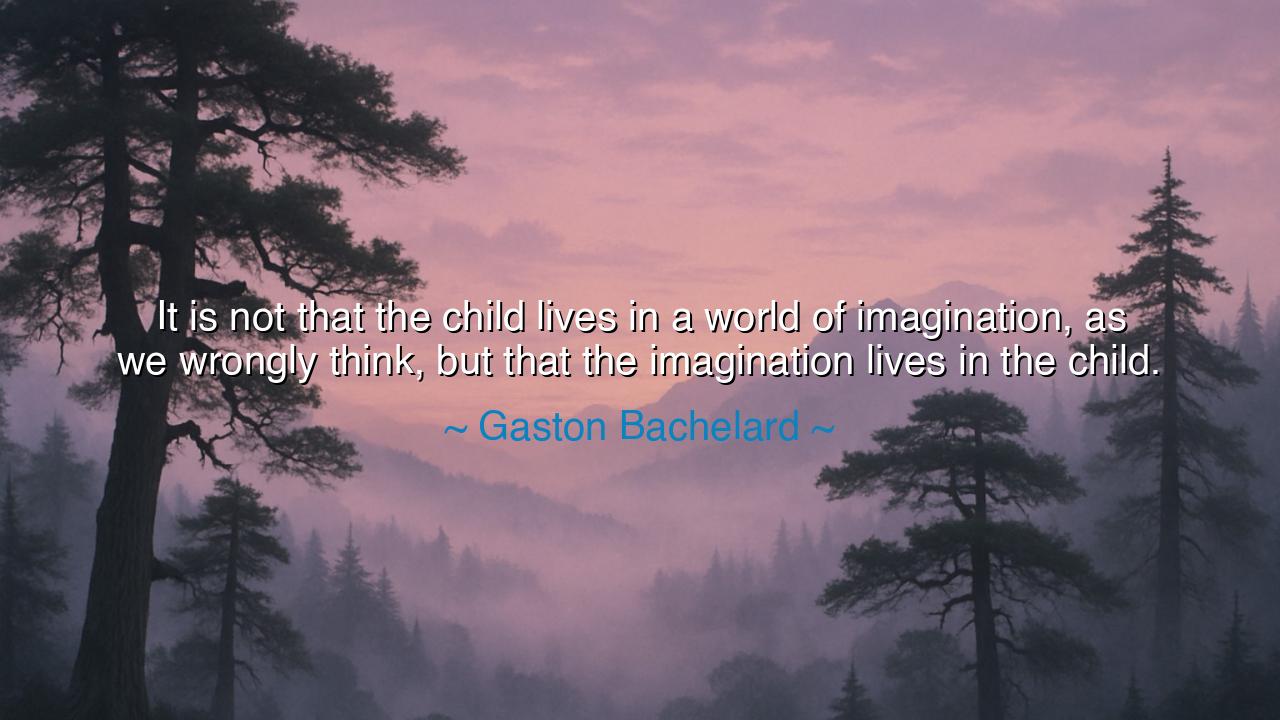
It is not that the child lives in a world of imagination, as we
It is not that the child lives in a world of imagination, as we wrongly think, but that the imagination lives in the child.






“It is not that the child lives in a world of imagination, as we wrongly think, but that the imagination lives in the child.” Thus spoke Gaston Bachelard, the philosopher of dreams and reverie, who gazed upon the human soul and saw that wonder itself was its truest dwelling. In this profound saying, Bachelard reverses the common belief about childhood and imagination. We think, he says, that the child is surrounded by fantasy—as though imagination were something external, a mist or illusion into which the young wander. But no—it is the imagination that dwells within the child, like a sacred flame kindled at birth. The child is not a visitor in the world of dreams; the dreams live in the child, shaping their sight, their joy, and their unspoken wisdom.
The origin of this quote lies in Bachelard’s meditations on the nature of imagination, as written in his poetic works such as The Poetics of Reverie and The Poetics of Space. To him, imagination was not a mere mental trick, not an escape from reality, but a living force—an energy that animates the soul and connects it to the cosmos. He saw the child not as a being lost in fantasy, but as one inhabited by pure creative power. In childhood, the imagination is fresh, unchained by fear or logic; it breathes freely, creating worlds out of clouds, kingdoms out of stones. The adult, burdened by reason and repetition, too often forgets this sacred guest within them. Bachelard’s words call us to remember—to see that imagination is not a place one visits, but a spirit one carries, sleeping within the heart.
To say that “the imagination lives in the child” is to recognize that the child is not inventing another world, but revealing the living magic already hidden in this one. The child sees the ordinary and makes it extraordinary. A puddle becomes an ocean; a shadow, a dragon; a whisper of wind, a song of angels. What to the adult seems illusion is, to the child, the deeper truth of being—that everything holds possibility. Bachelard understood that this perception is not falsehood but wisdom: the imagination does not obscure reality—it illuminates it. It allows us to see the world not merely as it is, but as it might yet become.
Consider the story of Helen Keller, blind and deaf from infancy, who lived for years in a silent darkness until her teacher, Anne Sullivan, found a way to unlock her world. When Keller first grasped that the sign for “water” corresponded to the cool stream running over her hand, a flood of meaning entered her life. But more than that, imagination entered. Though she had no sight or hearing, she began to build inner worlds of beauty, poetry, and spirit. “Everything has its wonders,” she later wrote, “even darkness and silence.” In her, as in every child, imagination was not an illusion, but a life force—a light that could not be extinguished by blindness or silence. She did not live in imagination; imagination lived in her, and through her it touched countless souls.
This truth speaks to the condition of every human being. As we grow older, the world teaches us to distrust the imagination—to value the measurable over the mysterious, the seen over the felt. We learn to silence the voice of wonder and call it maturity. But in doing so, we exile a part of ourselves. The child does not disappear with age; it is the imagination within us that grows quiet, waiting for us to remember. Bachelard’s words remind us that to live fully is to welcome that spirit again—to let it dwell in us as it once did freely, painting light upon the walls of our days.
O seeker of truth, do not scorn the visions of the child. For in them lies the origin of creation, of art, of love, of discovery. Every poet, every inventor, every saint who ever changed the world did so because they let the imagination live within them as it had when they were young. Einstein himself once said that imagination is more important than knowledge, for knowledge is limited, but imagination embraces the entire world. The child knows this instinctively; the adult must learn it again. To nurture imagination is not to flee the world, but to transform it—to see beauty where others see only routine, and possibility where others see only walls.
Therefore, let this be your lesson: guard the imagination that lives within you. Feed it with silence, with stories, with wonder. Look upon the world not with the eyes of cynicism, but with the gaze of a child who still believes the impossible may bloom. Let the free spirit of imagination guide your thoughts, your art, your love, and your living. For as Gaston Bachelard teaches, imagination is not a dream to escape into—it is the pulse of life itself, the sacred guest that gives color to the grayness of the world. And if you would live wisely and deeply, learn not merely to dream, but to remember that the dream still dwells within you, waiting to awaken.






AAdministratorAdministrator
Welcome, honored guests. Please leave a comment, we will respond soon